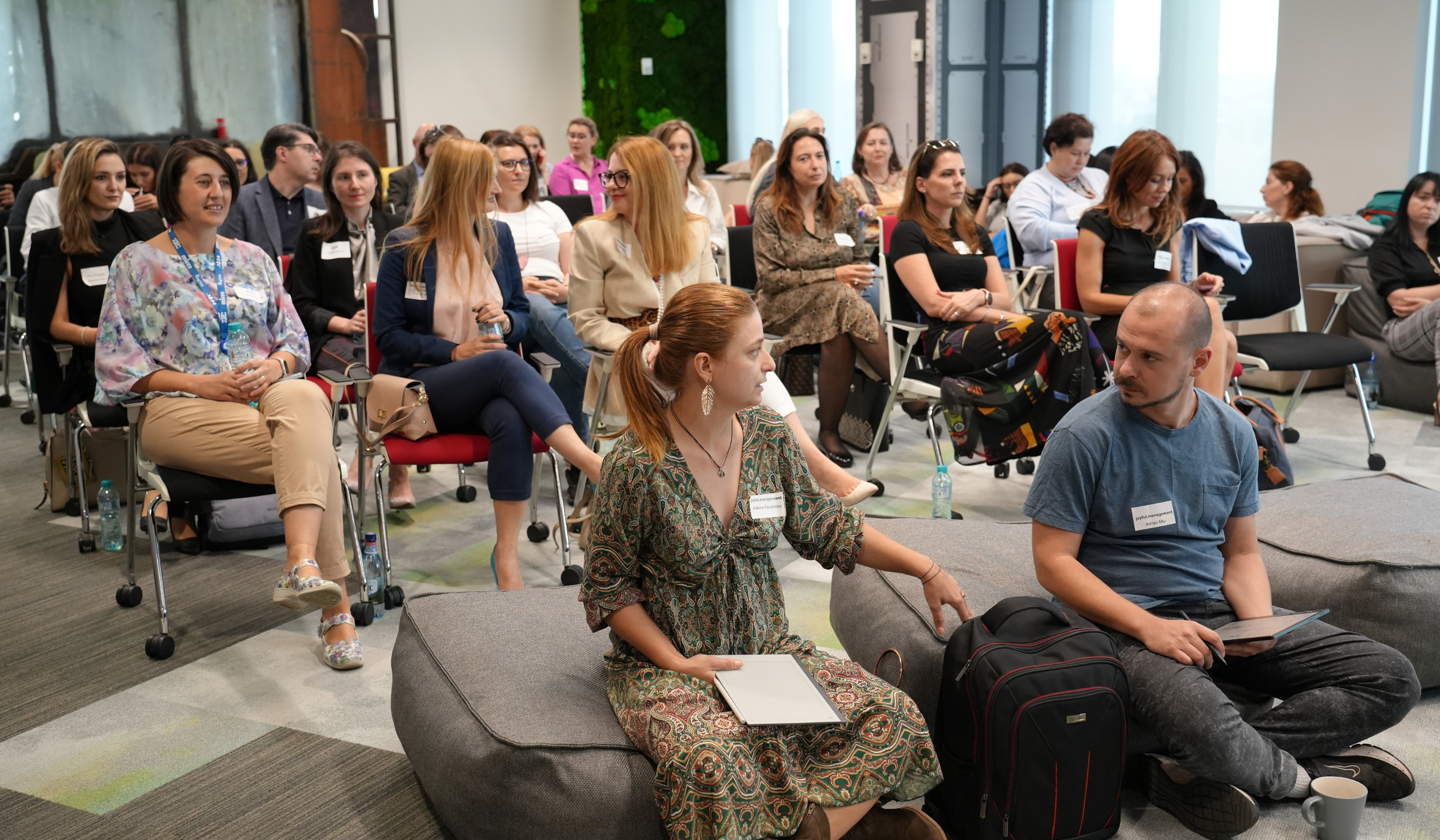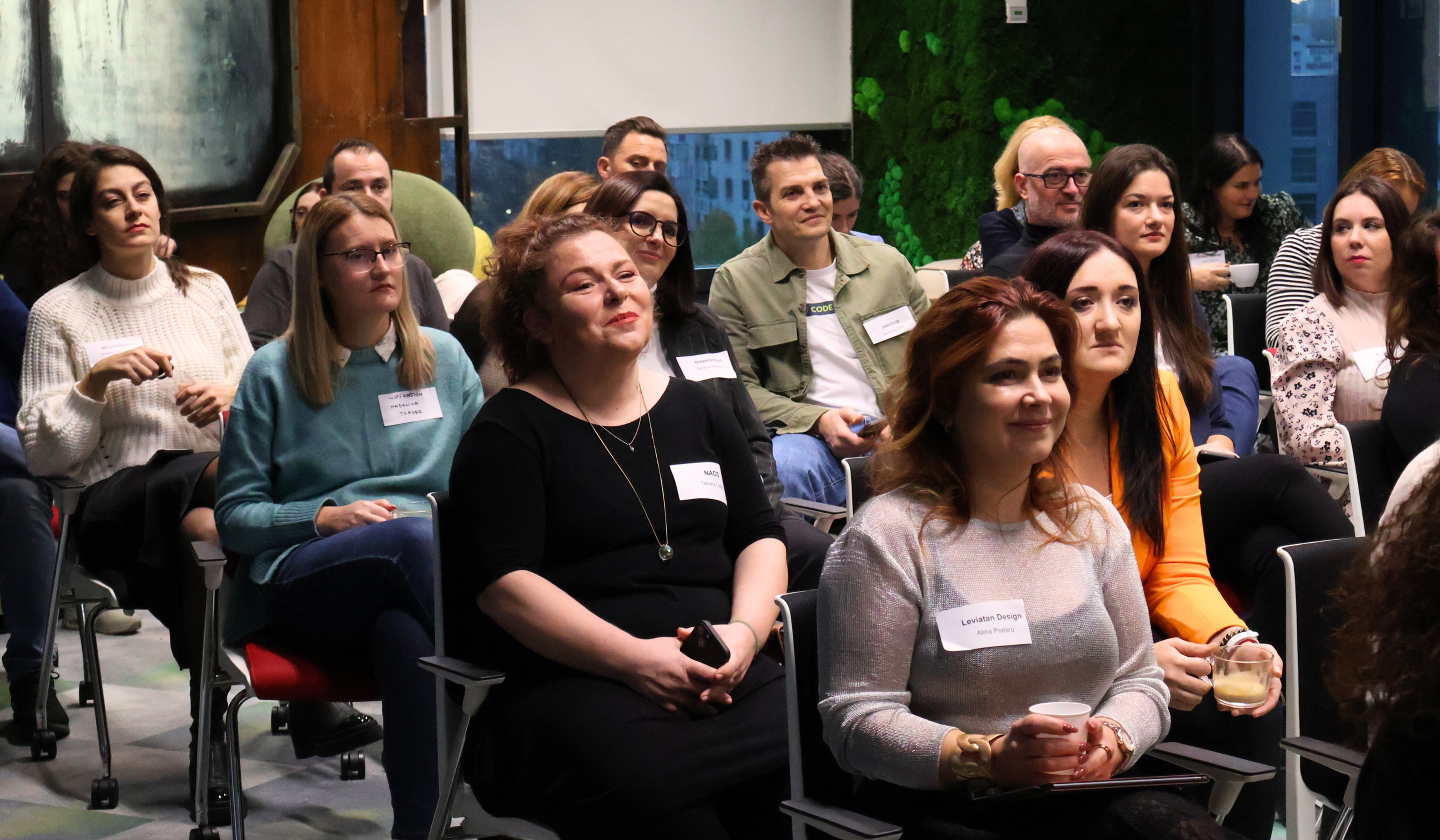SECTION
How to Navigate Generational Diversity in the Modern Workplace: Insights From Five Thought Leaders

Listen to this article:
On September 24, 2024, we hosted our fifth in-person event, which focused on the challenges brought by multiple generations in the workplace. Our panel brought together five experts from diverse organizations driven by the same mission: creating a healthy, people-centered culture.
The event’s scope was to learn how we can adapt organizations and teams to the needs of different generations without losing sight of each individual's uniqueness.
Studies show that by 2030, Millennials and Z-generations will represent 74% of the global workforce, which requires continuous adaptation and an environment conducive to innovation and development. Moreover, we’re currently in the working context of five active generations, from Baby Boomers to Generation Z, so organizations must unveil how these generations can collaborate effectively.
Together with our panelists and moderator, Simona Lapusan, our CEO and founder, we explored how these changes influence team dynamics, organizational culture, and long-term success. Read along to discover their insights!
Why is generational diversity a trending topic?
We broke the ice by asking our panelists why generational diversity matters more than ever. From demographic shifts to changing workplace expectations, it seems the focus has shifted to how different generations can collaborate better.
Nora Dobre, Senior People Lead at Temenos, pointed out that this topic is being discussed mainly due to social phenomena like aging populations, workforce migration, and falling birth rates, which are the main causes of five different generations working together.
Mădălina Uceanu, Managing Partner at Career Advisor, highlighted that while generational gaps have always existed, we’re now more aware of them and ready to take action. The goal is to create safe spaces where younger generations don’t feel judged but rather understood and valued.
Finally, Viorel Panaite, Managing Partner at Human Invest, noted that while generational diversity is a global issue, it’s especially relevant in Romania, where the pandemic and globalization have shaken up industries.

How are generations defined across countries? What’s specific to Romania in this context?
Our panel explored whether there are unique generational traits specific to Romania or whether these trends are universal. Generations can be defined differently from country to country due to the socio-cultural context. For example, Romania's Boomers and Gen X generations were marked by the transition from communism to capitalism, profoundly influencing their work-related values. By comparison, in the US, Boomers grew up in the context of the post-war economic boom, which led them to have different expectations from working life.
Viorel highlighted Romania’s geographic position and how proximity to the center of Europe has influenced cultural and generational shifts. While some changes are global, there are local nuances in how generations interact.
On the other hand, Nora argued that Romania doesn’t have something truly unique about generational dynamics. The younger generation has always challenged the status quo. An interesting example is that Gen Z’s habit of switching jobs more frequently may have also normalized "job hopping" for older generations.
Diana Stafie, Founder and Foresight Strategist at Future Station, shared a striking contrast between her early career and today’s Gen Z. When she started, salary was the top priority. Now, younger employees are more concerned with company values—like one Gen Z employee asking if a company exploits child labor before considering a job offer. There’s a growing interest in values and sustainability, spawning new job roles in this area. On a positive note, she also pointed out that Romania sees more women in leadership positions, which shows great potential for our openness toward diversity.
Mădălina remarked that Romania’s workplace culture is still in its “adolescence phase”. Recruiters here often focus too much on CVs instead of a person’s potential, which could explain why the generational topic is so relevant. She thanked younger generations for teaching us to set boundaries—no more working late or during weekends just because it’s expected.
Luiza Banyai, Co-Founder of the Institute for Workplace Psychosocial Health and Performance, pointed out that Romania is still learning about diversity and inclusion. The younger generation has an innate ability to navigate sensitive topics, like speaking to people with disabilities, and they’ve even reshaped norms around respect. For example, not addressing someone formally with "Mr." or "Mrs." doesn’t mean disrespect in their eyes. They’ve grown up communicating quickly through phones, and while they might not say "thank you" as much, they’re teaching us all valuable lessons about how recognition matters.

How do we approach the employee journey considering the new generations?
Starting from the premise that organizations need to adapt to individuals' personal needs, which vary depending on their stage of life, we asked our panelists how we should view the employee's journey today.
Nora stressed the importance of understanding your company's demographic makeup. Knowing these trends on a macro level allows businesses to make more customized decisions. Regarding benefits, what motivates a younger employee—like flexible time off—won't necessarily be the same for someone nearing retirement. Tailoring benefits to different generational needs is essential.
Luiza also emphasized the need for data-driven insights about what motivates each generation. Training managers, especially those in middle management and team leader roles, is essential to understanding what drives their people. HR must also evolve, focusing more on employer branding and data analytics than recruitment and administration.
Mădălina pointed out that the "employee journey" concept is relatively new, especially in the Romanian market. Customization is important, not only in terms of benefits but also in building relationships. The real challenge is creating an environment where all generations understand and work well together.
Viorel highlighted each generation's priorities: Boomers want to leave their mark on the company, Gen X is at a peak in life and values flexibility to care for aging parents, while Millenials are juggling young families and limited resources. Gen Z, on the other hand, isn't rushing into family life or management roles. They're divergent, pursuing multiple directions and redefining what a career looks like—they're more focused on having time for themselves.
The big takeaway? Regardless of generation, we all have common needs: conversations where we don't feel judged but also for contribution, impact, connection, knowledge, and recognition.

How can leaders help a multigenerational team collaborate and perform well?
Lastly, our panelists shared practical ways to enhance collaboration and performance in multigenerational teams.
Luiza stressed the importance of role clarity and regularly revisiting strategies. Emotional intelligence and mentorship are crucial, especially in diverse teams where cultural nuances need more attention.
Nora pointed out that diversity and reverse mentoring are key in a multicultural context. With demographic shifts and AI on the rise, recruitment strategies must evolve. The challenge now is no longer just about talent—it's about preparing for the future.
Viorel focused on the need for active listening. Learning how to really listen to each other across generations can prevent misunderstandings and foster stronger teamwork.
Mădălina highlighted the importance of self-awareness. Understanding our own limits—and those of others—can create a healthier, more respectful team dynamic.
Diana emphasized how teams relate to change. Monitoring trends, new business models, and evolving job roles will help us understand generational needs. She reminded us that the future is a source of imagination, and we need to make an effort to envision how things will evolve.

Building bridges across generations
As a Zillenial, navigating a multigenerational workplace's complexities has always been a learning experience. This event was precious because it gave me a broader understanding of how each generation sees the world, the workplace, and their role. What stood out to me the most is how crucial it is to actively listen, adapt, and create spaces where everyone feels valued and heard, no matter their age or background.
The insights shared by our panelists showed me that while we all bring something different to the table, the key to a thriving team is building bridges between these differences, rather than letting them divide us. By focusing on empathy, flexibility, and forward-thinking leadership, we can create a workplace that works for all generations, including my own.
If you found this conversation as valuable as I did, keep an eye on us! We'll host more events soon and would love to have you there as we continue exploring these important topics.
Also, if you want to learn how to manage Gen Z more effectively, I might have the perfect article for you. Enjoy your reading, and stay tuned for more updates!






